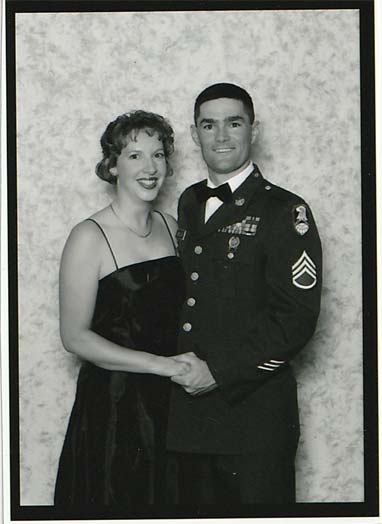How I learned to take ownership of my grief
Author: Jennifer Keeling
September is National Suicide Prevention Month. This article is the second of five stories by TAPS suicide loss survivors who wish to share lessons learned from their grief journeys. We invite you to share this story using the hashtag #SurvivorSunday. If you know or someone you know is struggling with thoughts of suicide, please call the National Suicide Prevention Lifeline 24/7 at 800-273-8255.
 Photo courtesy of Jennifer Keeling
Photo courtesy of Jennifer Keeling
Let me start off by saying that grief is hard work. There is no easy way around it or through it, and you definitely cannot skip over it. Grief and loss are difficult—plain and simple. This is especially true in the case of suicide loss, which often leaves survivors traumatized, stigmatized, and feeling completely powerless. But here’s a little secret: You can take ownership of your grief, and you can begin to find a path that leads you to your own personal healing journey.
When I lost my husband, Army First Sergeant Ronald Keeling, to suicide in 2009, the foundation upon which I had built my life crumbled in an instant. Ron and I had known each other since high school and had been married for 17 years. Our marriage was not always rainbows and butterflies. Deployments and frequent moves had taken their toll on us and our two teenage boys. However, we believed in commitment and that our love would stand the test of time. I believed in that love so wholeheartedly that when Ron took his life my trust in everything vanished. I didn’t know what was right anymore, and I had no faith in my own ability to make decisions. So I listened to what people around me told me to do.
That went on for a long time. Instead of finding my own path through my grief, I tried hard to live my new life according to what people suggested for me. Don’t get me wrong. Most people are well-intentioned when they offer advice to the bereaved, and that was true for me. But what I’ve learned in my journey is that no one grieves in the same way, and there are unfortunately no rule books on how to do it. What helps one person in her journey, may not be what helps another.
I used to be an avid reader before my husband died. So when someone told me that I should read a book on suicide loss, I went out and bought one. It didn’t work. Through the haze of my trauma and grief, I had a terrible time focusing on anything, let alone reading a book! It all seemed so impossible. My inability to make sense out of even one sentence deepened my sense of failure. I couldn’t even do the grief thing right. Of course I know now, after years of reflection, that this is not the case. We cannot “fail” at grieving. Grief is individualized to us, and the best we can do is to manage it in a way that works for us.
There are so many tools out there to help you to grieve, but finding the right one is challenging. You might have to try things that seem completely crazy. If you find that what you’ve chosen isn’t helping, then stop doing it and try something new. I needed someone to give me permission to put the book down and instead pick up a pen to try journaling.
What about you?
Maybe you’d prefer to be outside hiking in nature or working with horses through equestrian therapy. Or consider this—what you enjoyed before your loss may have changed, and you may have to find something totally new to bring you peace and healing. That is perfectly okay. Just keep trying and you’ll discover the thing that suddenly allows you to take a pause from your grief and maybe even smile. This is a chance for you to chart a new path. Let it be an opportunity to discover new depths of yourself that you never knew existed before your loss. So many things in your life have changed, but you have the power to embrace the change within yourself.
This method works for therapy as well. People will recommend therapists and even different types of treatment, whatever worked for them. But again, when it comes to grief, one size does not fit all. It’s all right to try several different counselors until you find the one that “speaks your language.” If you don’t feel comfortable and safe to share your deepest and most desperate pain, then find someone new. Similarly, if you try a method of treatment that doesn’t seem to be working for you, try others until you find the one that does. You have the right to advocate for yourself and to take control of how you grieve. And you have the power to choose who helps you along your journey.
Suicide loss can completely devastate us and destroy our lives’ foundations. But, it does not have to leave us permanently powerless. You are the only one who knows how to find what will bring you peace. Sure, listen to the suggestions of others, but then you decide whether it’s right for you. I am giving you permission (like I wanted someone to give me) to grieve the way you have to grieve and to use the tools that work for you. Stand up for yourself and take ownership of your grief.
Jennifer Keeling is the surviving spouse of Army First Sergeant Ronald Keeling and serves on TAPS Suicide Postvention Programs.
